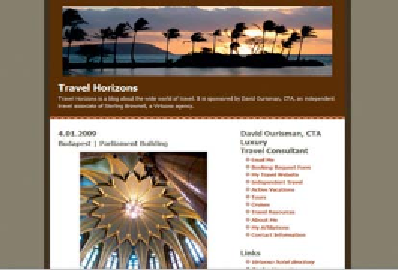Information Technology Reference
In-Depth Information
Figure 3.5
Blogs that are dedicated to luxury services and lifestyle including
hotels, restaurants and destinations like Travel Horizons contribute to shaping the
public's perceptions of luxury experiences around the world as consumers trust
their independent viewpoints more than official travel websites
In addition to blogs that touch directly on the consumer, there are luxury
blogs that are themed on several aspects of the luxury business and which
provide insight to key management issues in the luxury sector. Such blogs as
Interactive Luxury (www.interactiveluxury.com) (Figure 3.6), which is cen-
tered on luxury and the Internet and Luxury News (www.luxurynews.com)
(Figure 3.6), which focuses on approaches to luxury CRM, have a wide-
ranging audience including professionals, students and the wider public.
The majority of existing blogs are private and moderated by individuals
who have taken the obligation of bringing commentary, news, debate topics
and general information to the readers that share a common passion for a
subject. Millions of blogs in cyberspace have become successful in attract-
ing a dedicated and active audience, mainly as a result of the factors already
outlined in the early part of this chapter. Their success is not solely linked to
the theme of the blogs or the topics discussed, neither is it as a result of their
articulate manner of expression or their geographical location. The blogs that
thrive are those that are created by real people who have no ulterior agenda,
for real people who congregate to meet, connect, share and co-exist virtually.
Professional blogs that allow the advancement of consultants, researchers,
analysts, freelance journalists, artists, photographers, writers and all manners of
other professionals have also emerged by the million in the blogosphere. Blogs
give these self-publishers an opportunity to aggregate their visibility, credibility
and authority in their fields. They enable them to build businesses and also con-
gregate an audience as a sounding board for developing their expertise.
Several corporate bodies, like Coca Cola and The Four Seasons, have
tried to emulate successful blogs by reproducing their perceived winning for-
mula. They fail to realize that when a blog is operated by the employees of a
company, it has already lost a large chunk of its appeal without even trying.
First, companies are not people. No matter how much the company tries to




